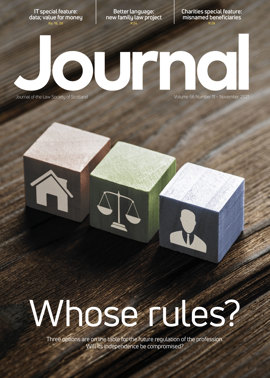The Eternal Optimist: “It’s good to talk”

Some of you probably remember Bob Hoskins with his Cockney accent encouraging us all to communicate more and use our telephones, with that famous strapline: “It’s good to talk”. A great message at the time, and one that I am sure increased both the social capital of the nation as well as BT’s profits. Strange now to think that it was landlines not mobile phones they were promoting, and email was still in its infancy. Today, though, the art of talking seems to be on the decline. Why, and does it matter?
In the same way that the landline has been replaced by the mobile, emails, for many, have now replaced phone calls as their primary form of communication. These are in some ways more efficient, and I understand many of the reasons why practitioners prefer them. Emails can be dealt with at a time that suits, can be kept short and to the point (avoiding some of those long rambling calls), and on occasion can avoid, or delay, some of the more challenging or difficult discussions. In essence, they provide a barrier between the busy practitioner trying to meet the needs of many clients and the client looking for immediate updates or more detailed explanations. Similar issues, I suspect, exist when it comes to dealing with practitioners in other firms.
Emails are, however, not without their challenges. They are a direct line to your desk, are instant, and as such, clients’ expectations about the speed and frequency of replies are high. No amount of automated responses will satisfy a client or colleague who is looking for an update or some important information, and the immediacy of the medium of email means that it is extremely hard to manage and indeed exceed expectations.
Why phone?
Written communications are a huge part of risk management, and an essential part of every transaction. I do wonder, though, whether the perceived benefits of moving more important conversations to email are always worth the benefits lost by not just picking up the phone. Here are at least a few reasons why:
- While there is some debate on the actual percentage, it is clear that only a limited portion of what we are trying to communicate is conveyed by the written (or spoken) word. A larger part is gleaned from things such as tone, body language and other signals.
- Our client’s understanding of language is seldom perfect, and certainly not identical to our own. Even words used in common parlance can be interpreted differently, leading at times to upset and misunderstanding. The old adage remains true: you know what you have written, not what the client has read. A conversation allows you to check that what you are communicating is being both heard and understood.
- There is both a time saving and a risk benefit in the ability of a telephone conversation to deal with both of the above. How often have you exchanged numerous emails with either a client or a colleague to clarify a point that could have been resolved instantly by a call?
- I have, at times, avoided a call, not wanting to have to deal with a challenging or difficult conversation. It never works. The issue does not go away and the avoidance or delay only adds fuel to the flames. Having that discussion and letting the other person know that the issue has your attention is always the first step to the best resolution.
- What other information is being lost that we would have picked up on when speaking? Perhaps something relevant to the transaction in hand or an opportunity for an additional piece of work? There is no doubt that clients will be more forthcoming with additional information when speaking.
Catch that call
I appreciate that telephone calls have their own challenges. We have all played telephone tag, with “call me back” messages being bounced backwards and forwards for days on end. That is a problem that can be addressed by scheduling calls with clients, as I’m sure many of you do. I’ve found Calendly particularly useful for this (calendly.com/), one simple link to be sent to a client or colleague allowing them to book a time in your diary to speak.
At the core of what we do, we are a people business and people are social creatures. Those conversations are what help create the relationships with clients and can be the most enjoyable part of the day. If the last 18 months has taught us anything, it is the importance of maintaining human interactions. Perhaps then the next time you are in doubt, just pick up the phone. It might be better to talk.
Regulars
Perspectives
Features
Briefings
In practice
Online exclusive
In this issue
- Good legal software suppliers listen to you
- The trends that will shape law firms in 2022
- Technology won't solve everything...
- Key trends in legal tech adoption for UK law firms
- The top 4 benefits of moving to a cloud solution
- Why cyber risk management is not the same as IT support
- Business growth: finding the right package







